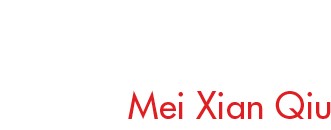What Can I Say About Mei?
Move over David Lachapelle and Pierre et Gilles. Get back Wang Qingsong.
Here comes Mei Xian Qui. Eastern themes of post Chairman Mao politics enliven a bizarre dialog in Mei’s highly original, super sexy, uber-feminine photography. Mei is a quintessential Los Angeles artist, whipping up images in which Asian and Western themes implode in a delightful mélange of post modern sensibility.
Mei’s photographs take me into a world I’ve never seen before. Many allude to classic western tableaux, a nod to her painterly background. But then Mei infuses her work with a dramatic narrative. She catches her models in moments filled with expectancy and anticipation. She poses her characters, which are often gender ambiguous, as if they are in a play. Her actors often allude to a sexual back story, and seem to promise a big surprise at the end, after they have left her stage.
Mei Xian Qiu was born in the town of Pekalongan, on the island of Java, Indonesia, to a third generation Chinese minority family. She has lived all over Europe, is based in Los Angeles and makes frequent trips back to China. “I feel 100% Chinese Indonesian, and 100% American. I am a part of a kind of floating culture. My sense of individual identity becomes linked to something ever shifting and transient.”
I first met the Mei Xian Qui through the Los Angeles Art Association – we are both artist members. Peter Mays, the association’s director thrilled to promote her work, was quite proud that his Gallery 825 could provide a launch pad for her stratospheric career trajectory. Mei is blowing up big. At their Photo LA booth, her photographs sold handsomely. Then the L.A. Art Association took the artist to Basel Switzerland, where she sold every work she showed and took orders for five additional pieces. Peter was delighted and plans to take Mei to Art Basel Miami Beach in December. “I love her work; it’s timely, contemporary and challenging.”
I have watched Mei’s photography mature and marry her diverse inspirations to their current incarnation, which she renders in Plexiglas. Mei prints onto the Plexiglas itself allowing a gentle backlight to infuse her imagery. Against a delicate palette of tropical birds and pink flowers, this soft kiss of backlight lays down a gossamer femininity and lightness that leaves me gender intrigued and scratching my head in delight wondering what is really going on in her photographs. The artist, sweet-natured and quick-smiled,
cultivates an air of purposeful mystery.
Rex Bruce, director of LACDA, Los Angeles Center for Digital Art, who showed the artist a few months ago, told me, “Mei Xian Qui is an artist with the perfect balance of humor, politics, multiculturalism and visual pleasure. Her images are exquisite and irresistible—her peculiar combinations of gay love, Chinese takeover, and L.A. pop sensibility illicit a sense of surprise in the onlooker.”
How gay is Mei? Can the work of an Asian woman on Plexiglas really evoke gay anyway? And what is gay today? In her post-modern world of ethnic diversity, can’t we all be gay for a day? Half the fun in Mei’s work is trying to decode the artist’s campy, sometimes zany, quasi-political iconography.
Mei Xian Qui is about process-melding her Asian and Los Angeles identities to constantly collide in clever, amusing and surprising ways. Her work is adorable, campy art that has both pith and ash. Who could ask for more? Resistance is futile. I’m wanting a piece to hang on my living room wall.
________________________________________________________________________________________________________

